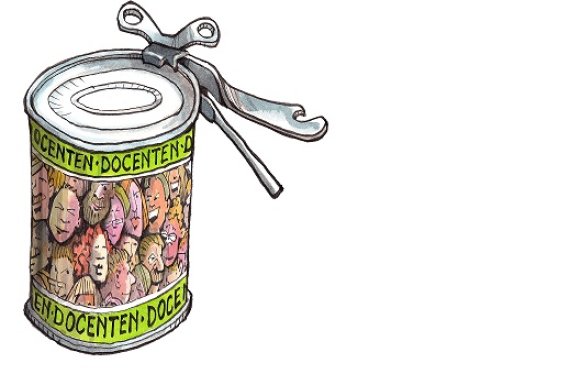illustration Henk van Ruitenbeek

Edwin Kelhout
Manager Marketing & Digital
‘Ten years ago, all academic and applied universities had these amazing recruitment campaigns full of meaningless phrases. But we stopped doing that years ago. We give honest information to people looking to choose a degree. That’s our duty, it’s what society demands from us and it’s precisely what we do. We give the people information and advice, working closely with the degree programmes so that the people choosing make the right choice and we avoid students dropping out. The dropout rate in Wageningen is by far the lowest in the Netherlands so we are doing a good job at that. Wageningen is a university with a very distinctive profile and a focus on topical, global challenges. People are needed to study those challenges. More people than in the past. In WUR’s case, the growth in new students is also about the recruitment of new scientific staff. It is about recruiting talent. And that talent is much needed to explore the potential of nature to improve the quality of life.’

Bram Büscher
Professor of the Sociology of Development and Change
‘I think it could definitely be taken down a notch or two. The money that is saved on marketing could then be spent on extra lecturers. After many years of growth on many different fronts, including students, it’s now time for stabilization and in-depth investments in the academic staff and science itself. That would be good for the students too as then they would get lecturers who have more room for top-class scientific research and more time for the students themselves.’
The money that is saved in marketing could be spent on extra lecturers

Sophie Galema
Nutrition and Health student and chair of the Student Council (speaking in her personal capacity)
‘WUR focuses on issues that are of major importance to society. That’s why active recruitment is important, so that people know Wageningen is there. At the same time, the university should always aim for top-quality education. If the number of students grows, capacity should increase too; otherwise lecture halls get more and more packed and you lose the small-scale teaching. You can already see signs of that. As soon as growth leads to a decline in the quality of the education, you have a problem. The university is trying to avoid any deterioration in teaching quality due to the growth; they are putting up a new teaching building for instance, which will increase capacity. But of course that’s not something you do in three weeks.’

Anja Kuipers
BSc & MSc programme director for Plant Sciences
‘Yes, WUR should continue to actively recruit students. Every year, there is a new cohort of schoolchildren who have to decide on their degree. And there are also new students every year who are deciding on their Master’s. Those people need to know what WUR has to offer. If we stop recruiting, it might not take much to trigger a rapid decline in student numbers. Informing and advising potential new students remains an important priority. At Plant Sciences, we know from experience how important continuous, sound information and advice is in making potential students aware of our degree programme. We definitely won’t be stopping this.’

Hannie van der Honing
Study coordinator for Cell Biology
‘In my opinion, student numbers should stop growing. Quite apart from the workload for lecturers, the crowded rooms or lack of rooms, and the timetabled longer days, our team of lecturers is concerned about the quality of the teaching. There is huge pressure on what makes Wageningen unique — lots of contact hours, intensive practicals, personal contact between students and lecturers and a good student-to-staff ratio. We’ve already had to scrap one practical, for instance, because it didn’t fit in the timetable. That doesn’t mean we should no longer actively recruit students. I think it is actually good if a broad public becomes and remains aware of WUR and the issues we work on here. But there are other ways of stabilizing growth, for example an enrolment limit or a motivation or admission test.‘

Arnold Bregt
Dean of Education
‘Our recruitment isn’t aimed at getting as many students as possible. We use careful information and advice to help students find the right degree programme. The student intake this year is similar to last year. It is true that the total number of Master’s students has increased compared to last year, but that’s mainly because smaller cohorts are leaving and larger cohorts are moving on to the next year. We don’t have a growth goal as such. We are pleased if we can keep the same level and we use selective recruitment to see how we can let student numbers per programme keep pace with capacity and the labour market. WUR also aims to be an “international classroom”, and targeted recruitment lets us achieve a diverse student population. We are trying to increase the intake from African countries, for example; that’s why five scholarships were granted this year, among other things. There are also degree programmes such as Animal Sciences that still have room for more students. So we are recruiting selectively on fronts where there is room for more students, and less so where it is already full.’

